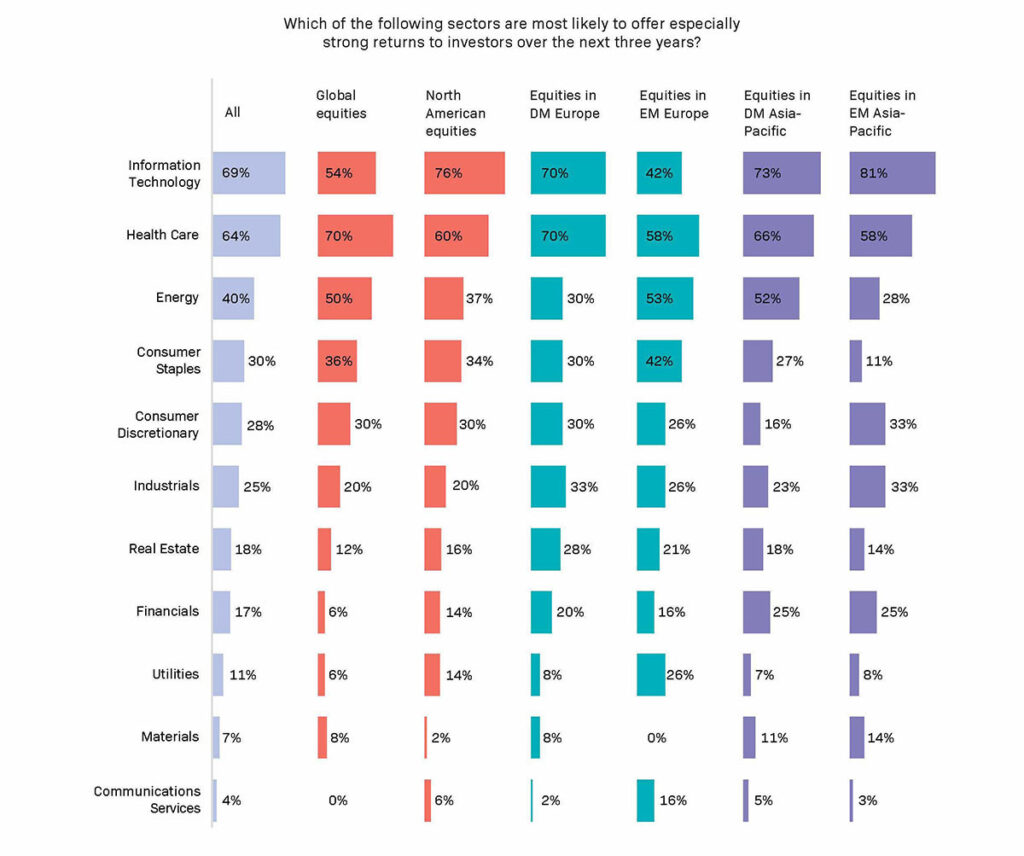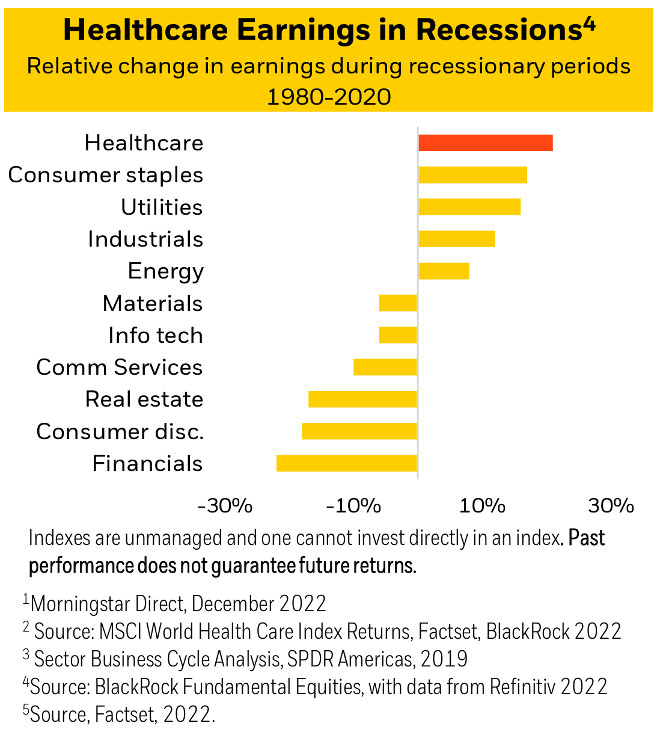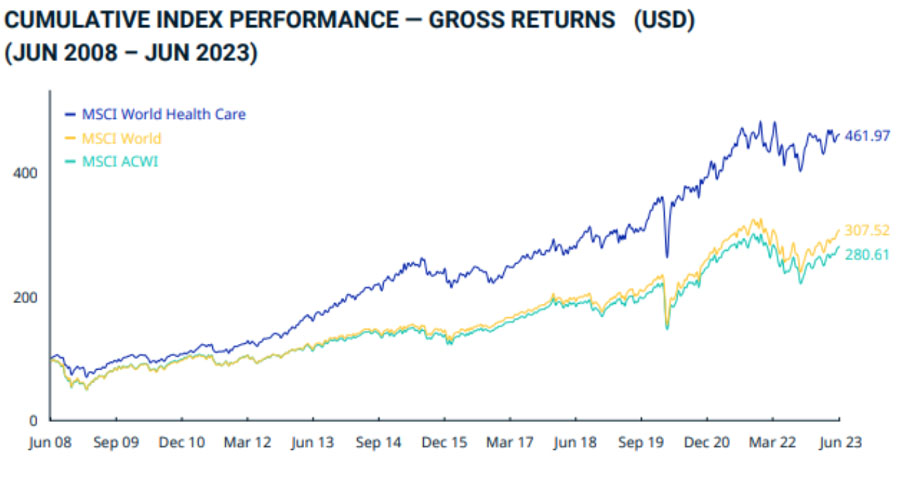Health care stocks offer a prescription for uncertain times
With persistent inflation and high interest rates stoking fears of an impending recession, investors are flocking to defensive stocks that can weather economic storms[1] – and health care businesses are arguably the most resilient of all.
Companies in the sector have shown more robust earnings during downturns than those of any other major industry, including defensive favourites such as utilities and consumer staples. Health care is now also getting a boost from the growing spend on health, wellness and vaccines in the wake of the pandemic and as a result of fast-aging populations in many major economies.
Accordingly, the MSCI World Health Care index had as of 30 June this year achieved a 50% greater gross return in US dollar terms than the MSCI World index since June 2008.[2]
As a consequence, 64% of investment decision-makers at global financial institutions expect health care stocks to deliver strong returns over the next three years, according to an investor survey commissioned by EquitiesFirst and carried out by Institutional Investor.
This wide-ranging study provides insight into how over 300 investors – including asset managers, foundations, pension schemes and endowments – are responding to dramatic shifts in the macroeconomic and geopolitical environment.
Bright outlook for health care
The only sector inspiring greater investor optimism than health care is technology, the report shows. Meanwhile, there is scant enthusiasm for industries more susceptible to high interest rates and slowing economic growth – notably real estate and finance.

There are reasons behind this optimism. The structural factors driving health care’s past outperformance remain firmly in place. If anything, populations are aging even faster, and health care spending in developing countries looks set to accelerate given the rapid growth of their middle classes, especially in Asia.[3]
The Covid-19 pandemic also helped accelerate technological advances in medical devices and drugs, with researchers now exploring the use of mRNA vaccines for a variety of other diseases.[4] As more treatments are developed for thousands of previously untreatable diseases, health care spending can be expected to increase further.
This trend could blur the lines between the two categories where investors tend to place health care stocks. On one side are pharmaceuticals, managed care and medical equipment suppliers, which are regarded as steady defensive plays. Meanwhile, the likes of biotech firms and AI-based health care providers are seen as high-growth stocks that traditionally fare badly when interest rates are high.
Technology has changed the game
That dichotomy may no longer be relevant, however, as emerging technologies transform everything from drug development to patient care.[5]
Advances in 3D printing have paved the way for customisable treatments;[6] robots and less invasive techniques are revolutionising surgery;[7] and AI and cloud computing is powering telehealth services in low-income countries and remote locations.[8]
What’s more, innovations in diagnostics and emerging life-science tools are making it possible to identify diseases at an earlier stage, while big data and analytics are supporting the push to prioritise preventative health care.
Investors must, however, be alert to headwinds facing the sector.
Not least of these is that governments will scale back health care spending following bumper outlays during the pandemic. There are also growing questions over how medical and medtech companies can access patient data to run their business models or create new products amid rising concerns over the need to maintain the privacy of sensitive information.
What’s more, governments are working on market reforms to make drugs more affordable, which could eat into pharmaceutical companies’ profit margins. The realignment of global supply chains as a result of geopolitical shifts could also drive up drugmakers’ costs.
A selective approach to investing can therefore be beneficial, and there is no lack of choice when it comes to health care sub-sectors and themes. As well as defensive strategies focusing on established players, investors can choose from the dizzying array of small-cap and private companies that are working on emerging technologies and novel use cases.
For equities investors looking to boost returns by going global – another finding from the EquitiesFirst x Institutional Investor study – the MSCI World Health Care index contains 142 large- and mid-cap constituents from 23 countries.
While health care may be seen as a defensive sector, it is also extremely dynamic, characterized by rapid innovation and a fast-changing regulatory landscape. Investors must be prepared to manage their portfolios and adapt quickly to a shifting industry and environment.
One way to do that is by accessing securities-backed financing. By using their securities or digital assets as collateral, long-term investors can obtain relatively stable, cost-effective capital with no restrictions on the use of proceeds, including equity investments in new health care themes or technologies. Given how fast these opportunities evolve, this kind of flexible funding can be a valuable tool for investors looking to preserve and grow their wealth during tumultuous times.
[1] https://www.wsj.com/articles/investors-flock-to-safety-plays-but-stock-fomo-lingers-f821acbd
[2] https://www.msci.com/documents/10199/c41a73d1-9037-4dbd-a175-703d3bb77ae6
[3] https://www.bloomberg.com/news/articles/2021-09-02/more-than-1-billion-asians-will-join-global-middle-class-by-2030
[4] https://www.nature.com/articles/s41591-021-01393-8#:~:text=mRNA%20can%20be%20engineered%20not,related%20to%20the%20immune%20system.
[5] https://www.alliancebernstein.com/corporate/en/insights/investment-insights/redefining-offense-and-defense-in-equities-the-evolution-of-technology-and-healthcare.html
[6] https://pubmed.ncbi.nlm.nih.gov/30767736/
[7] https://www.mayoclinic.org/tests-procedures/robotic-surgery/about/pac-20394974
[8] https://www.ft.com/content/cdc166d4-6845-11ea-a6ac-9122541af204
إخلاء مسؤولية
أعدت هذه الوثيقة خصيصاً للمستثمرين المعتمدين أو المستثمرين المتطورين ماليًّا أو المستثمرين المحترفين أو المستثمرين المؤهلين، على النحو الذي يقتضيه القانون أو غيره، وهي ليست موجهة للأشخاص الذين لا يستوفون المتطلبات ذات الصلة وينبغي عدم استخدامها من أجلهم. يستخدم محتوى هذه الوثيقة لأغراض إعلامية فقط ويغلب عليه الطابع العام ولا يلبي أي غاية محددة أو حاجة مالية معينة. تخص وجهات النظر والآراء الواردة في هذه الوثيقة أطرافًا ثالثة ولا تعكس بالضرورة وجهات نظر شركة “إيكويتيز فيرست” أو آراءها. لم تفحص شركة “إيكويتيز فيرست” المعلومات الواردة في هذه الوثيقة أو لم تتحقق منها بشكل مستقل، ولا تقدم أي تعهد بمدى دقتها أو اكتمالها. تخضع الآراء والمعلومات الواردة في هذه الوثيقة للتغيير من دون إشعار. لا يمثل محتوى الوثيقة عرضًا لبيع (أو طلب عرض شراء) أي أوراق مالية أو استثمارات أو منتجات مالية (يشار إليها باسم “العرض”). يجب تقديم أي عرض مماثل لذلك فقط من خلال عرض ذي صلة أو وثائق أخرى تحدد شروطه وأحكامه المادية. لا يشكل أي محتوى وارد في هذه الوثيقة توصية أو طلبًا أو دعوة أو إغراء أو ترويجًا أو عرضًا لشراء أو بيع أي منتج استثماري من شركة “إيكويتيز فيرست” أو “إيكويتيز فيرست هولدينجز المحدودة” أو الشركات التابعة لها (يشار إليها مجتمعة باسم “إيكويتيز فيرست”)، ولا يجوز تفسير هذه الوثيقة بأي شكل من الأشكال على أنها مشورة استثمارية أو قانونية أو ضريبية أو توصية أو مرجع أو إقرار مقدم من شركة “إيكويتيز فيرست”. وعليك طلب المشورة المالية المستقلة قبل اتخاذ أي قرار استثماري بشأن منتج مالي معين.
تحتفظ هذه الوثيقة بحقوق الملكية الفكرية لشركة “إيكويتيز فيرست” في الولايات المتحدة ودول أخرى، ويشمل ذلك على سبيل المثال لا الحصر، الشعارات الخاصة بها وغيرها من العلامات التجارية وعلامات الخدمة المسجلة وغير المسجلة. تحتفظ الشركة بجميع الحقوق المتعلقة بملكيتها الفكرية الواردة في هذه الوثيقة. ينبغي لمستلمي هذه الوثيقة عدم توزيعها أو نشرها أو إعادة إنتاجها أو إتاحتها كليًّا أو جزئيًّا بأي شكل من الأشكال لأي شخص آخر، لا سيما الأشخاص في دولة قد يؤدي توزيع هذه الوثيقة فيها إلى خرق أي شرط قانوني أو تنظيمي.
لا تقدم شركة “إيكويتيز فيرست” أي تعهد أو ضمان فيما يتعلق بهذه الوثيقة، وتخلي مسؤوليتها صراحة عن أي ضمان ضمني بموجب القانون. وعليه تقر بأن شركة “إيكويتيز فيرست” ليست مسؤولة تحت أي ظرف من الظروف عن أي أضرار مباشرة أو غير مباشرة أو خاصة أو تبعية أو عرضية أو عقابية أيًّا كان نوعها، منها على سبيل المثال لا الحصر، أي أرباح مفقودة أو فرص ضائعة، حتى إذا تم إخطار الشركة بإمكانية وقوع مثل هذه الأضرار.
تدلي شركة “إيكويتيز فيرست” بالتصريحات الإضافية الآتية التي قد تطبق في دول الاختصاص القضائي المذكورة:
دبي: تخضع شركة “إيكويتيز فيرست هونج كونج المحدودة” (التي يشار إليها باسم “المكتب التمثيلي بمركز دبي المالي العالمي”) الكائنة في مبنى حي البوابة 4، الطابق 6، المكتب 7، مركز دبي المالي العالمي (التي تحمل ترخيصًا تجاريًّا رقم CL7354) للوائح سلطة دبي للخدمات المالية بصفتها مكتبًّا تمثيليًّا (رقم مرجع الشركة لدى سلطة دبي للخدمات المالية:F008752 ). جميع الحقوق محفوظة.
تعد المعلومات الواردة في هذه الوثيقة عامة بطبيعتها، وإذا نُظر إليها على أنها مشورة، فإن أي مشورة واردة هنا عامة وقد تم إعدادها من دون النظر إلى أهدافك أو وضعك المالي أو ملاءمة منتجاتك المالية أو احتياجاتك.
تُستخدم المواد الواردة في هذه الوثيقة لأغراض معلوماتية فقط وينبغي عدم تفسيرها على أنها مشورة مالية أو عرض أو طلب أو توصية لشراء منتجات مالية أو بيعها. تعد المعلومات الواردة في هذه الوثيقة عامة بطبيعتها، وأي مشورة واردة هنا هي عامة وقد تم إعدادها من دون النظر إلى أهدافك أو وضعك المالي أو ملاءمة منتجاتك المالية أو احتياجاتك. لذا قبل استخدام أي من هذه المعلومات، يجب أن تفكر في مدى ملاءمتها لأهدافك ووضعك المالي واحتياجاتك وطبيعة المنتج المالي ذي الصلة. يمكنك استشارة مستشار مالي معتمد إذا لم تكن بعض محتويات هذه الوثيقة واضحة بالنسبة إليك.
تختص هذه الوثيقة بمنتج مالي لا يخضع لأي شكل من أشكال التنظيم أو الاعتماد الخاص بسلطة دبي للخدمات المالية. لا تتحمل سلطة دبي للخدمات المالية أي مسؤولية عن مراجعة أي وثائق تتعلق بهذا المنتج المالي أو التحقق منها. وعليه، لم تعتمد سلطة دبي للخدمات المالية هذه الوثيقة أو أي وثائق أخرى مرتبطة بها ولم تتخذ أي خطوات للتحقق من المعلومات الواردة فيها، ولا تتحمل أي مسؤولية ناجمة عنها.
أستراليا: تحمل شركة “إيكويتيز فيرست هولدينجز (أستراليا) ذات المسؤولية المحدودة” (رقم الشركة في أستراليا: 399 644 142) ترخيصًا لمزاولة الخدمات المالية في أستراليا (رقم الترخيص: 387079). جميع الحقوق محفوظة.
توجه المعلومات الواردة في هذه الوثيقة للأشخاص في أستراليا فقط المصنفين بأنهم عملاء في قطاع التجارة بالجملة على النحو المحدد في القسم 761G من قانون الشركات لعام 2001. قد يُقيد توزيع المعلومات على الأشخاص الذين لا تنطبق عليهم هذه المعايير بموجب القانون، ويجب على الأشخاص الذين يمتلكونها طلب المشورة ومراعاة أي قيود تتعلق بها.
تستخدم المواد الواردة في هذه الوثيقة لأغراض معلوماتية فقط وينبغي عدم تفسيرها على أنها عرض أو طلب أو توصية لشراء منتجات مالية أو بيعها.
تُعد المعلومات الواردة في هذه الوثيقة عامة بطبيعتها وليست مشورة شخصية بشأن المنتجات المالية. أي مشورة واردة في الوثيقة هي عامة فقط وقد تم إعدادها من دون النظر إلى أهدافك أو وضعك المالي أو احتياجاتك. لذا قبل استخدام أي من هذه المعلومات، يجب أن تفكر في مدى ملاءمتها لأهدافك ووضعك المالي واحتياجاتك وطبيعة المنتج المالي ذي الصلة. عليك طلب المشورة المالية المستقلة وقراءة بيانات الإفصاح ذات الصلة أو وثائق العرض الأخرى قبل اتخاذ أي قرار استثماري بشأن منتج مالي معين.
هونغ كونغ: تمتلك شركة “إيكويتيز فيرست هولدينجز هونج كونج المحدودة” ترخيصًا من النوع 1 من لجنة هونغ كونغ للأوراق المالية والعقود الآجلة، وهي مرخصة في هونغ كونغ بموجب قانون مقرضي الأموال (ترخيص مقرض الأموال رقم 2024/1659). لم تراجع لجنة هونغ كونغ للأوراق المالية والعقود الآجلة هذه الوثيقة. لا تمثل هذه الوثيقة عرضًا لبيع أوراق مالية أو طلبًا لشراء أي منتج تديره أو تقدمه شركة “إيكويتيز فيرست هولدينجز هونج كونج المحدودة”، لكنها موجهة للمستثمرين المحترفين لا للأفراد أو المؤسسات التي تكون هذه العروض أو الدعوات غير قانونية أو محظورة بالنسبة إليهم.
كوريا: توجه هذه الوثيقة فقط للمستهلكين الماليين المحترفين أو المستثمرين المحترفين أو المستثمرين المؤهلين الذين يتسلحون بالمعرفة ويتمتعون بالخبرة الكافية للدخول في معاملات تمويل الأوراق المالية، وهي غير مخصصة للأشخاص الذين لا يستوفون هذه المعايير وينبغي عدم استخدامهم إياها.
المملكة المتحدة: “إيكويتيز فيرست (لندن) المحدودة” هي شركة مرخصة وتخضع لرقابة هيئة الإدارة المالية البريطانية (FCA) في المملكة المتحدة. توزع هذه الوثيقة في المملكة المتحدة وتتاح فقط لفئات الأشخاص المذكورين في المادة 19 (5) (محترفي الاستثمار) والمادة 49 (2) (الشركات ذات الأرصدة المالية الضخمة وجمعيات الأفراد وغيرها) من الجزء الرابع من مرسوم الترويج المالي (FPO) لعام 2005 التابع لقانون الخدمات والأسواق المالية لعام 2000، وأي نشاط استثماري يتعلق بهذا العرض متاح فقط لهؤلاء الأشخاص، ولا يشارك فيه سواهم. يجب على الأشخاص الذين ليست لديهم خبرة مهنية في أمور الاستثمار أو من لا تنطبق عليهم المادة 49 من مرسوم الترويج المالي عدم الاعتماد على هذه الوثيقة؛ لأنها أعدت فقط للأشخاص المؤهلين بوصفهم مستثمرين محترفين بموجب توجيه الأسواق في الأدوات المالية (MiFID) وهي متاحة لهم.© حقوق الطبع والنشر لعام 2024 محفوظة لصالح شركة إيكويتيز فيرست هولدينجز هونج كونج المحدودة. جميع الحقوق محفوظة.


